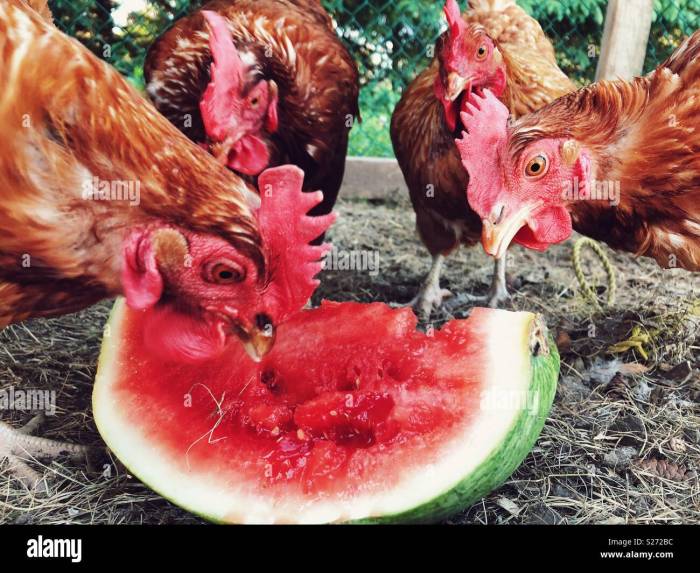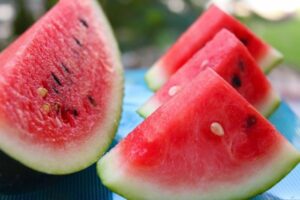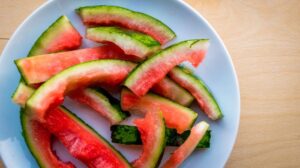Can chickens eat watermelon? The answer is yes, but with caution. Watermelon offers nutritional benefits for chickens, but excessive consumption can pose risks. Dive into this comprehensive guide to understand the nutritional value, health benefits, safe feeding practices, and potential risks associated with feeding watermelon to chickens.
Watermelon, a juicy and refreshing fruit, is a popular summer treat. But can our feathered friends enjoy this sweet delight too? Let’s explore the ins and outs of feeding watermelon to chickens.
Nutritional Value of Watermelon for Chickens
Watermelon offers an array of essential nutrients that contribute to the well-being of chickens.
This juicy fruit is rich in vitamins, minerals, and antioxidants that play crucial roles in various bodily functions, growth, and development.
Vitamins
- Vitamin A: Supports vision, immune function, and feather development.
- Vitamin C: Enhances immune response, collagen production, and wound healing.
- Vitamin E: Protects cells from damage caused by free radicals, boosting overall health.
Minerals
- Potassium: Regulates fluid balance, muscle function, and nerve transmission.
- Magnesium: Supports bone development, energy production, and muscle relaxation.
- Calcium: Essential for strong bones, eggshell formation, and muscle contraction.
Antioxidants, Can chickens eat watermelon
- Lycopene: A powerful antioxidant that protects cells from damage, reducing the risk of chronic diseases.
- Citrulline: Converted to arginine in the body, which improves blood flow and reduces inflammation.
Health Benefits of Watermelon for Chickens

Watermelon offers numerous health benefits to chickens, contributing to their overall well-being.
Watermelon’s high water content aids in digestion and prevents dehydration, particularly during hot weather. Its fiber content promotes a healthy digestive system, reducing the risk of digestive issues.
Antioxidant Benefits
- Watermelon is rich in antioxidants, such as lycopene, which help protect cells from damage caused by free radicals. These antioxidants support the immune system and reduce the risk of chronic diseases.
- Lycopene has been linked to improved egg quality and hatchability in chickens.
Hydration
- Watermelon’s high water content helps keep chickens hydrated, especially during hot weather or when access to fresh water is limited.
- Dehydration can lead to various health issues, including decreased egg production and reduced growth.
Safe Feeding Practices for Watermelon

To ensure the well-being of your chickens while providing them with the nutritional benefits of watermelon, it is crucial to adhere to safe feeding practices.
Before offering watermelon to your chickens, it is essential to prepare it properly. Remove any seeds as they can be a choking hazard, and discard the rind as it is difficult for chickens to digest.
Recommended Frequency and Portion Sizes
Watermelon should be given to chickens as an occasional treat rather than a regular part of their diet. Limit the frequency to once or twice a week to prevent digestive issues.
The portion size should be appropriate for the size of your flock. A small handful per chicken is sufficient to provide them with the nutritional benefits without overfeeding.
Potential Risks of Watermelon for Chickens
While watermelon can be a nutritious and refreshing treat for chickens, there are a few potential risks to consider when feeding it to them.
One concern is that watermelon has a high water content, which can lead to excessive water intake if chickens consume too much of it. This can result in diarrhea or other digestive issues. Additionally, the high sugar content of watermelon can contribute to nutritional imbalances if chickens eat too much of it, leading to weight gain or other health problems.
Digestive Issues
The high water content of watermelon can cause digestive issues in chickens, such as diarrhea. Diarrhea can lead to dehydration and electrolyte imbalances, which can be serious if not treated promptly. If you notice your chickens experiencing diarrhea after eating watermelon, it is important to stop feeding it to them and consult with a veterinarian.
Nutritional Imbalances
Watermelon is high in sugar, which can contribute to nutritional imbalances in chickens if they eat too much of it. Nutritional imbalances can lead to a variety of health problems, including weight gain, obesity, and reproductive problems. It is important to feed watermelon to chickens in moderation to avoid these risks.
Alternatives to Watermelon for Chickens: Can Chickens Eat Watermelon

Chickens can benefit from various fruits and vegetables that offer similar nutritional value to watermelon. These alternatives can provide essential vitamins, minerals, and antioxidants to supplement or replace watermelon in a chicken’s diet.
Fruits
- Berries (blueberries, raspberries, strawberries): Rich in antioxidants and vitamins, berries promote overall health and well-being.
- Apples: Contain dietary fiber, vitamin C, and potassium, supporting digestion and immunity.
- Bananas: Provide potassium, fiber, and natural sugars for energy and electrolyte balance.
Vegetables
- Carrots: Excellent source of vitamin A, which supports vision and immune function.
- Sweet potatoes: Rich in beta-carotene, vitamin C, and fiber, promoting healthy growth and development.
- Spinach: Contains iron, calcium, and vitamin K, essential for blood health, bone development, and clotting.
By incorporating these alternatives into a chicken’s diet, you can ensure they receive a balanced and nutritious intake, promoting their overall health and well-being.
Last Point
In conclusion, watermelon can be a nutritious and refreshing treat for chickens when fed in moderation. By following safe feeding practices and considering potential risks, chicken owners can offer this summery fruit to their flocks as a supplement to their regular diet. Remember to prioritize a balanced and varied diet to ensure the overall health and well-being of your chickens.
User Queries
How often can I feed watermelon to my chickens?
As a treat, offer watermelon to your chickens once or twice a week.
Can baby chicks eat watermelon?
No, baby chicks should not be fed watermelon as their digestive systems are not fully developed.
Can chickens eat watermelon seeds?
Yes, chickens can eat watermelon seeds, but they should be removed before feeding as they can be a choking hazard.







Leave a Comment